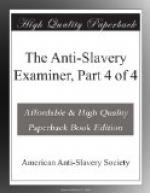OBJECTION X.
But it is said, your theory results in good men leaving government to the dishonest and wicked.
ANSWER. Well, if to sustain government we must sacrifice honesty, government could not be in a more appropriate place, than in the hands of dishonest men.
But it by no means follows, that if I go out of government, I leave nothing but dishonest men behind. An act may be sin to me, which another may sincerely think right—and if so, let him do it, till he changes his mind. I leave government in the hands of those whom I do not think as clear-sighted as myself, but not necessarily in the hands of the dishonest. Whether it be so in this country now, is not, at present, the question, but whether it would be so necessarily, in all cases. The real question is, what is the duty of those who presume to think that God has given them clearer views of duty than the bulk of those among whom they live?
Don’t think us conceited in supposing ourselves a little more enlightened than our neighbors. It is no great thing after all to be a little better than a lynching—mobocratic—slaveholding—debt repudiating community.
What then is the duty of such men? Doubtless to do all they can to extend to others the light they enjoy.
Will they best do so by compromising their principles? by letting their political life give the lie to their life of reform? Who will have the most influence, he whose life is consistent, or he who says one thing to-day, and swears another thing to-morrow—who looks one way and rows another? My object is to let men understand me, and I submit that the body of the Roman people understood better, and felt more earnestly, the struggle between the people and the princes, when the little band of democrats left the city and encamped on Mons Sacer, outside, than while they remained mixed up and voting with their masters, shoulder to shoulder. Dissolution is our Mons Sacer—God grant that it may become equally famous in the world’s history as the spot where the right triumphed.




